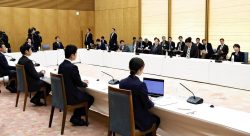U.S., Japanese Monetary Policies: Both Nations’ Central Banks Should Strive to Discern Future Uncertainty
15:22 JST, December 24, 2024
The Japanese and U.S. economies are both robust, but uncertainty about the future is rising. This is because it is difficult to predict the impact of high tariffs and other policies being considered by the incoming U.S. administration of President-elect Donald Trump.
It will be important for both the Bank of Japan and the U.S. Federal Reserve Board to carry out their policy management while discerning how the incoming U.S. administration will behave.
The Fed has decided to cut its policy rate by 0.25 points to a target range of 4.25%-4.50% per year. It was the third consecutive policy meeting in which the interest rate was cut since the central bank shifted its monetary policy toward easing in September.
The Fed predicts two additional rate cuts of its usual rate range in 2025, down from four cuts indicated in its estimate in September.
The U.S. consumer price index for November rose 2.7% from a year earlier, the second consecutive month of accelerated growth. The figure exceeded the Fed’s 2% target and concerns are beginning to emerge about a resurgence of inflation.
At a press conference, Fed Chair Jerome Powell stated that the process of interest rate cuts has entered a “new phase.” He probably believes that it is appropriate to slow the pace of interest rate cuts going forward.
The process of curbing inflation through tightening monetary policy while maintaining a robust economy is said to be difficult to handle when it enters a final phase. This is because there is a possibility of wage growth accelerating and households are expected to continue spending.
Furthermore, if the next Trump administration follows through on such election pledges as large tax cuts, high tariffs and deportation of illegal immigrants, it could cause higher wages due to an overheated economy and labor shortages, which will inevitably increase inflationary pressure.
The Fed should watch carefully for a resurgence of inflation that would force it to raise interest rates again.
Meanwhile, the Bank of Japan has decided to keep its policy rate at around 0.25%, the third consecutive meeting at which it has left rates unchanged since its decision to raise rates in July.
There was some speculation in the market that the BOJ would raise interest rates this month. However, Gov. Kazuo Ueda expressed a cautious stance at the press conference, saying, “We need more information on wage trends, including the momentum for the shunto spring wage negotiations.” He also said, “There is a great deal of uncertainty surrounding the economic policies of the incoming U.S. administration.”
In response to the decision this time, there has been a growing trend of the yen weakening and the dollar strengthening based on the view that the interest rate differential between Japan and the United States will not narrow for the present. A weaker yen invites higher consumer prices through higher import costs, which hurts household budgets. The BOJ will need to pay attention to the exchange market as well.
The Japanese economy is at a stage in which it should be transitioning to a growth-oriented economy in which both wages and investment increase. It is natural that interest rates will rise along with this transition. It is hoped that the BOJ will determine the timing of additional interest rate increases while keeping an eye on the moves of the economy and the incoming U.S. administration.
(From The Yomiuri Shimbun, Dec. 24, 2024)
Top Articles in Editorial & Columns
-

Riku-Ryu Pair Wins Gold Medal: Their Strong Bond Leads to Major Comeback Victory
-

Reciprocal Tariffs Ruled Illegal: Judiciary Would Not Tolerate President’s High-Handed Approach
-

China Provoked Takaichi into Risky Move of Dissolving House of Representatives, But It’s a Gamble She Just Might Win
-

Japan’s Plan for Investment in U.S.: Aim for Mutual Development by Ensuring Profitability
-

Flu Cases Surging Again: Infection Can Also Be Prevented by Humidifying Indoor Spaces
JN ACCESS RANKING
-

Producer Behind Pop Group XG Arrested for Cocaine Possession
-

Japan PM Takaichi’s Cabinet Resigns en Masse
-

Man Infected with Measles Reportedly Dined at Restaurant in Tokyo Station
-

Israeli Ambassador to Japan Speaks about Japan’s Role in the Reconstruction of Gaza
-

Videos Plagiarized, Reposted with False Subtitles Claiming ‘Ryukyu Belongs to China’; Anti-China False Information Also Posted in Japan





















